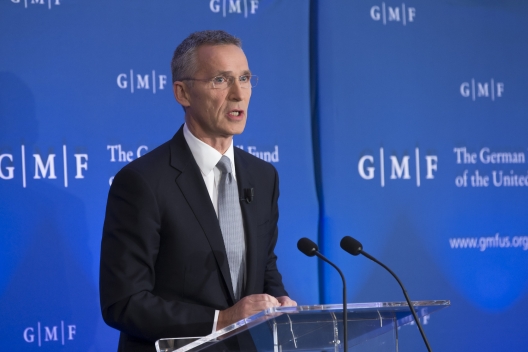 Allies such as the United States and Canada to the West; Iceland and Norway to the North; And Turkey and Albania to the South-East, are not members of the EU. But, together, they are essential for European security and will continue to be.
Allies such as the United States and Canada to the West; Iceland and Norway to the North; And Turkey and Albania to the South-East, are not members of the EU. But, together, they are essential for European security and will continue to be.
After Brexit, non-EU Allies will account for 80% of NATO’s defence spending. Three of the four NATO battlegroups to be deployed in Poland and the Baltic States will be led by non-EU Allies. So, we cannot afford to decouple European Defence from non-EU NATO Allies.
They all have an important stake in European security. And we must continue to acknowledge that. One way of doing so is by developing stronger NATO-EU cooperation. This will also reinforce the transatlantic bond.
The Joint Declaration that I signed together with Presidents Tusk and Juncker in Warsaw in July raised our cooperation to a new level.
Both organisations face security challenges of a new depth and complexity. And neither has the tools to overcome those challenges alone.
NATO has a unique set of experience, expertise and capabilities. A tried and tested command structure. Key enablers such as AWACS surveillance planes. And high-end fighting capabilities. Our ability to do both collective defence and crisis management complements perfectly the wide range of capabilities the EU has to offer. Together, we can be a formidable force for good.
Our combined efforts in the Aegean have been a major step forward. Helping to cut the lines of illegal migration. Last week, we launched the maritime security Operation Sea Guardian. With ships, submarines and maritime patrol aircraft operating in the Central Mediterranean.
Which will also be used to support the EU’s Operation Sophia. NATO and EU cyber defence teams already participate together in exercises. And have agreed to exchange information about threats, and share best practices.
We are working to implement the joint statement we made in Warsaw. And this is one the most important things when it comes to how to further strengthen the cooperation between NATO and EU and we are doing so with full respect for both organisations’ distinct mandates, decision-making autonomy and institutional integrity.
Next month, High Representative Mogherini and I will present concrete proposals to further strengthen NATO-EU cooperation. In seven key areas: Countering hybrid threats, operations, cyber defence, defence capabilities, supporting the defence industry – on both sides of the Atlantic, exercises, and training and capacity building for our partners.
When NATO and the EU work together we can deliver real security. For our nations. And beyond.
Excerpts from speech by NATO Secretary General Jens Stoltenberg at the German Marshall Fund of the United States (GMF) in Brussels, November 18, 2016.
Image: Secretary General Jens Stoltenberg, Nov. 18, 2016 (photo: NATO)
